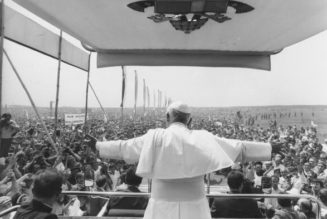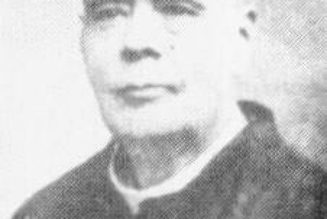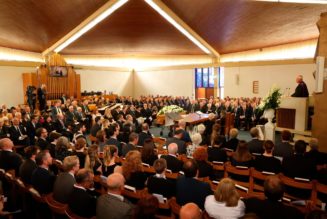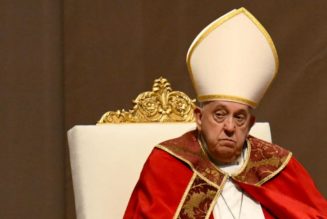
> Italiano
> English
> Español
> Français
> All the articles of Settimo Cielo in English
*
Nothing seems to break the stride of the “synodal journey” undertaken by the Catholic Church of Germany. Neither the criticisms nor the defections of the rare dissenting bishops. Nor the serious concerns of Rome:
> Francis and the Schism of Germany. History of a Nightmare
Cardinal Reinhard Marx has been succeeded, as head of the episcopal conference, by Limburg bishop Georg Bätzing (pictured). But without any course correction. No less talkative than his predecessor, the new president immediately strung together a series of reckless statements on the most burning issues of the synod’s agenda, from the female priesthood to same-sex couples, along with the presumption of giving marching orders to to the universal Church:
> Bätzing: “Die Zeit läuft uns weg”
> Bischof Bätzing für Segnung gleichgeschlechtlicher Paare
> German bishop calls for Rome synod to discuss German synod
The aims of the German Church’s advancing flank are plain to see in the texts produced by the synod so far:
> Sex, Women, Power. The Three Challenges Germany Is Issuing To the Church
But at the basis of the undertaking is the evident intention of subverting the original structure of the Church, not only German but universal, in the name of a democratization in step with the times.
This push brought a response on Settimo Cielo in mid-May from Professor Pietro De Marco, philosopher and historian by training, former professor of the sociology of religion at the University of Florence and on the theological faculty of central Italy:
> The Synod of the German Church Under the Analyst’s Lens. A Revolution That Self-destructs
But the statements of the new president of the German episcopal conference have induced De Marco to add new elements to his criticism of the “Synodale Weg,” in which he sees at work the rash revolutionary approach typical of a certain Catholic “intelligencija” not only in Germany but as seen for example in Italy with the community of Bose and its founder Enzo Bianchi, punished in recent days by Pope Francis with exile from the monastery.
*
German synod. On the new president of the episcopal conference and other misadventures
by Pietro De Marco
In revolutionary adventures, the formulations of the “critical” culture see the alternation – depending on the interlocutors and situations – of radical statements with great subversive objectives and of circumscribed statements with reduced targets, at first glance trivial. This ideological bilingualism also belongs to Catholic critical public opinion, insofar as it also belongs to the category of the revolutionary “sociétés de pensée” analyzed by Augustin Cochin.
In Italy, the recent disciplinary measures that have affected the community of Bose and the person of its founder Enzo Bianchi concern, in fact, an important node of a network of “sociétés de pensée,” Catholic and Reformed, in which the communicative oscillation between theological moderation and radicalism is widespread practice. Hard to say how much of this is sincere and how much is feigned. Bianchi was sensitive to the criticisms of orthodoxy; years ago he complained about an evaluation by Sandro Magister and myself. But many critics, including the late Antonio Livi (to whom we are indebted for a decisive book against the neo-modernist collapse of theological language, “True and false theology,” Rome, 2012), had shown the faultiness of the dogmatic system of the prior of Bose, a faultiness invisible to most and therefore made to be assimilated and reproduced without caution.
In many Catholic subcultures there is on the one hand the critic-destroyer, generally a cleric or theologian, male or female, of recent generation, with a smattering of biblical scholarship and without dogmatic formation, in short an ideologue, and on the other a majority of clerics and lay people who use radical slogans but aim for more accessible results. Many bishops also take part in this pragmatic oscillation rather than in the radicalism of the subversive leadership. In Germany they seem almost the totality.
Well then, what is the stance of the German episcopal conference’s new president, Limburg bishop Georg Bätzing?
Just after taking his post, Bätzing immediately confirmed the reforming projects of the “Synodale Weg,” the synodal journey underway in Germany. Answering the question: “What is your vision of the near future of your Church?” he ruled out being “the visionary sort”; the essential message of the synod to men will be that life is stronger than death, as a result transforming the meaning of being and calling oneself Catholic, in which sense he too can accept being counted among the visionaries. The manner of expression appears cautious, but the “konkrete Vision” is not.
The “Synodale Weg” – Bätzing said – continues to ask for a “blessing” for the divorced and remarried (a difficult matter but one that can perhaps be dealt with case by case according to canon law, while not theologically vacating the sacrament) and Eucharistic intercommunion between Catholics and Christians of other confessions, which Rome has also granted in the past, for sufficient reason and by way of exception. So nothing dramatic in itself. Except that, as always in the “Synodale Weg,” it is the erroneous and presumptuous motives that cause dismay. “There is now quite a bit of agreement on the meaning of what we believe and celebrate,” Bätzing assured. Here is the symptomatic oscillation.
It is in fact fact widely believed in Germany that the conception of the Holy Supper is now the same between Protestants and Catholics. This consensus can only have come about through a genuine protestantization of the Catholic theology of the sacraments. While no news has come forth that German Protestants have significantly recovered the common Eucharistic theology of the universal Church, from which they exclude themselves. So for Bätzing to say, as he has, that against this objective background Christians may “decide with good arguments and according to their conscience” on issues like intercommunion is a careless statement, all the more condemnable from the mouth of a bishop called to be a teacher, not an instigator of convenient opinions. What is really at stake here is the very concept of Eucharistic practice, in the sense of the classic “knowing and thinking about what one is going to receive”; and the Catholic meaning of the sacrament must also be jealously protected by discerning the differences with the other confessions.
Bätzing still maintains that the synod’s decisions will find subjects, or rather “alliances” (Koalitionen) capable of implementing them; an assumption that in itself is trivial but threatening, because instead there is nothing trivial, except in the mind of the German episcopal conference, about the kind of subjects who would see to the “realization” of demands all theologically on the razor’s edge. Just as the idea of demanding from the pope a universal synod based in Rome for extending to the whole Church the examination of the results of Germany’s “Synodale Weg” is arrogant, even if without a future. Isn’t the congregation for the doctrine of the faith enough?
Then when Bätzing defines as “no longer accepted” the “arguments against” the female priesthood (which are actually binding doctrinal statements), he shows that the episcopal ‘magisterium’ and the average theological culture have formed in Germany not a Christian people, but a public opinion now so distorted as to pursue nonsense: that of babelically remaking the Church. A Catholic secularism has in fact been generated, to then exhibit this recent and intentional mentality as an argument against the tradition of “lex credendi,” of the canon of belief (Glaubensregeln).
I believe that the German Catholics, the majority, who are being subjected to the initiative of their bishops and of supposed representatives of the laity such as the “Zentralkomitee der deutschen Katholiken,” a real power bloc present in force in the assembly, should be urged to oppose the uncontrolled course of the “Synodale Weg.”
May they react as clergy and laity where they live, parishes, religious orders, press. May the Catholic intellectuals regain strength. May the canonical way be employed as well. The corruption of doctrine and an absolutely abnormal practice of “reform” are plain for all to see. May German Catholicism not bow down out of a sort of deference, completely misplaced and certainly not owed today, to a hierarchy that is dissolving itself.
,






